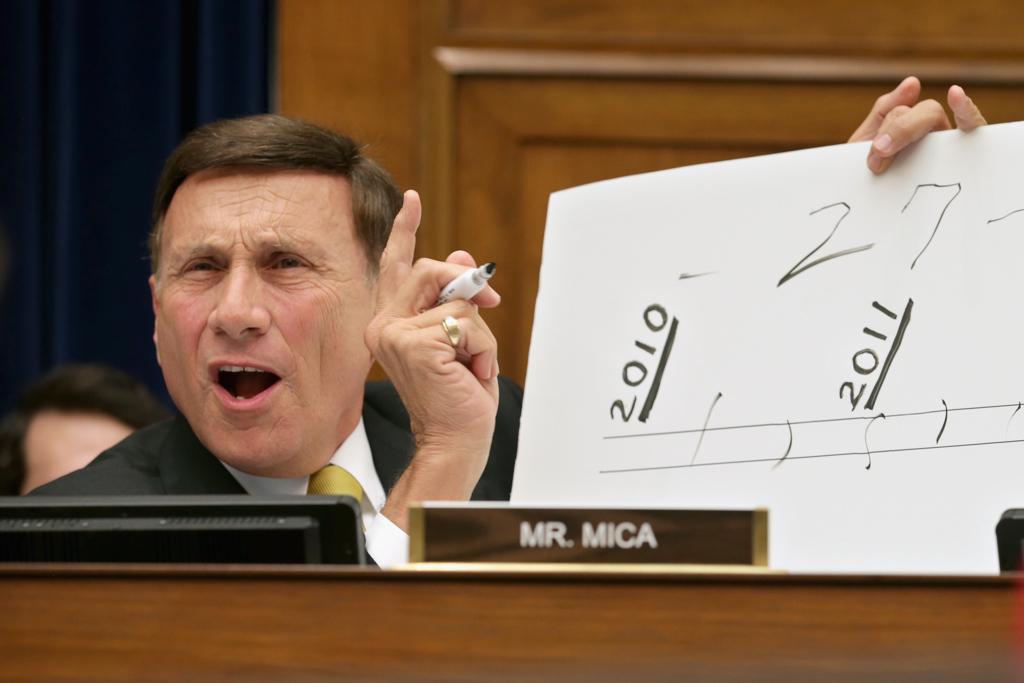A fighting president is the best antidote to GOP hyperventilating on ‘scandals’
House Oversight and Government Reform Committee member Rep. John Mica (R-FL) uses a marker and white board while questioning witnesses during a hearing May 22, 2013 in Washington, DC.
OWL’S HEAD, Maine — The American public is often pilloried for being out of touch, unaware or even uninterested in the inner workings of our democracy. A recent poll had something like 35 percent of the American public unable to name a single Supreme Court justice.
Despite a weeklong force-feeding of the IRS/Tea Party-targeting expose, Americans are more discerning about would-be government scandals than Republican congressmen assume. Or perhaps just more inured to the daily garbage seeping out of Washington that passes for a dysfunctional bunch of second-raters "doing the people's business." Or maybe just less willing to listen to the political party that has threatened to keep the country from paying its debts when most of those debts were created when that party last held the presidency.
The point is, in a poll in mid-April, 51 percent of those surveyed approved of President Obama's performance. Not a resounding vote of confidence, though about average for recent second term presidents. But — and here's the interesting part — in a new poll taken a month later, after the all-day, every-day Republican-led hearings about the IRS and hard on the heels of their endless arm-flailing over Benghazi, Obama's ratings had risen to 53 percent.
One hopes the White House is now working clandestinely to get Republican congressmen to expand their inquiries and appoint even more investigative committees, so that by mid-June Obama's approval ratings will be approaching 60 percent.
Sure, the IRS shouldn't have gone after Republican-supported organizations that were within their legal rights to raise money from undisclosed donors. But once the Supreme Court had opened the political-donation floodgates, there was a rapid doubling — for an already understaffed IRS — of ostensibly "social welfare" groups promoting political causes seeking tax-exempt status.
Under the circumstances, it was hardly surprising the IRS wanted to verify these new start-ups were legal. That many more Republican Tea Party-type groups were checked out than Democratic ones may have reflected bias by some IRS employees, but it was clearly not at the direction of top IRS officials. And to compare it to Watergate — and hyperventilate about impeachment, as some Congressional Republicans have done — is only to further degrade Congress in the eyes of the vast majority of Americans.
Is Obama out of touch? Is his managerial style too aloof? Arguably. But let's not confuse his hands-off, above-the-fray approach to the current IRS hullabaloo with Richard Nixon whose White House tapes showed openly discussing plans to sic the IRS on political foes.
If Republican congressmen were really interested in the issue, they'd be reviewing the laws Congress passed that gave tax-exempt status to organizations that can spend up to 50 percent of their efforts on political activities.
And if they wanted to act responsibly, they could challenge the Obama administration to work jointly on a total revamping of our tax code; it's a nightmare.
What would a simplified tax code look like? Here's an example: three tax brackets, say 13 percent for all income above $12,000; 15 percent above $35,000; and 20 percent, above $75,000). Juggle the rates and the numbers, the principles are the important part: all income is taxed; all deductions are eliminated; a one-pager that anyone can file.
Of course, there is an obvious downside in simplifying the tax code at a time when unemployment is still at 7.5 percent. Think of the millions of accountants and lawyers and tax consultants, not to mention lobbyists, who would suddenly be out of work.
The newspapers are filled with Congressional questioning of tax strategies pursued by that most quintessential of American companies, Apple, which kept billions in profits out of the government’s hands. Despite the righteous indignation of Congress members, no one has accused Apple of breaking the law, just of taking advantage of the tax shelters and loopholes that Congress, in its wisdom, created. The corporate tax code is as out of control as the one for individuals.
Maine's Senator Olympia Snowe, who quit Washington after 35 years, the last 18 in the Senate, wrote an article in this past Sunday's Portland paper discussing her just published book, "Fighting for Common Ground."
In it, she pinpointed what really bothers the public these days: they "are angry, fed up and fearful that the current dysfunction that's preventing us from solving our most challenging problems will continue as a permanent culture." One of four key issues she mentioned was "overhauling our broken tax code," along with immigration reform, the federal debt and entitlement programs.
The country's problems are not new and Obama certainly did not cause them. But, in the face of today's radical opposition, Obama has become part of the problem: no, he's not out of touch. But without results, his upbeat rhetoric is tiresome and self-defeating. It's reached a point where even his supporters yawn and fidget as he gives another of his sincere, well-spoken, empty talks: words are fine but they are no substitute for action.
It's time Obama came out fighting.
Mac Deford is retired after a career as a Foreign Service officer, an international banker, and a museum director. He lives at Owls Head, Maine and still travels frequently to the Middle East.
We want to hear your feedback so we can keep improving our website, theworld.org. Please fill out this quick survey and let us know your thoughts (your answers will be anonymous). Thanks for your time!
